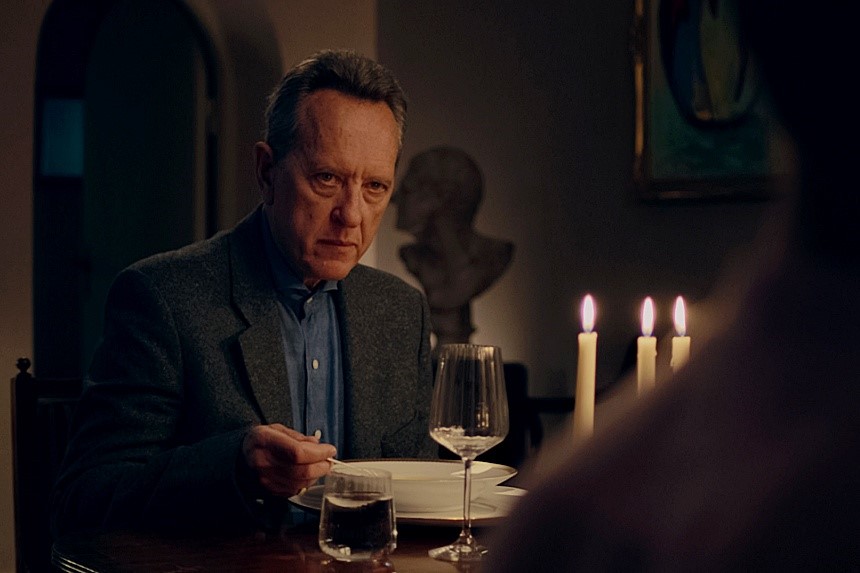The Lesson
⭐️ ⭐️ ⭐️ ⭐️
Rating: R
Run Time: 1 hour 42 minutes
Stars: Richard E. Grant, Julie Delpy, Daryl McCormack, Crispin Letts
Writer: Alex MacKeith
Director: Alice Troughton
Reviewed at the Tribeca Film Festival
Moody and sad, The Lesson employs a first-rate cast to explore the dynamics of a family in a death spiral, and the infinitely selfish patriarch at the controls, grimly piloting everyone nose-first into the ground.
Richard E. Grant — who should have won an Oscar for his turn as Melissa McCarthy’s self-destructive friend in Can You Ever Forgive Me? — stars as J.M. Sinclair, introduced to us in a prologue as Britain’s most beloved author. Sinclair projects a jaunty public face, happily telling an audience of ardent fans that while average writers struggle to be original and good writers borrow others’ ideas, “Great writers steal.”
Shamelessly so, in the case of Sinclair, who somehow gets away with pocketing other writers’ turns of phrase like a shoplifter at Barnes & Noble. But not even his most forgiving fans would countenance his latest theft: a manuscript he keeps under lock and key at his lavish country estate.
Wandering the halls of that mansion are Sinclair’s somber wife, Hélène (Julie Delpy), a high-powered art curator, and their troubled teenage son Bertie (Stephen McMillan). There’s also the smothering presence of an older son, Felix, who less than two years earlier drowned himself in the murky pond behind the house. It doesn’t take long for director Alice Troughton and writer Alex MacKeith to reveal the source of all this misery: Sinclair is a distant father whose only encounters with Bertie involve tirades of scathing criticism and expressions of disappointment. He’s also a dismissive husband who refers to his wife as “the missing mother,” an unspeakably cruel taunt recalling the fact that she was not at home to prevent their older son’s apparent suicide.
Into this fog of dysfunction parachutes a young would-be writer named Liam (Daryl McCormack), hired by Hélène to tutor Bertie for his upcoming college entrance exams. Quietly charming and slyly observant, Liam patiently observes of the family’s peculiarities and posts notes about them on his guest house mirror, unaware that while he is taking account of the Sinclairs, the family butler (Crispin Letts) is always in the shadows, taking stock of this handsome houseguest.
MacKeith’s twisty-turny script sequentially pushes each character to the forefront, tipping the realization that each, in their own way, is manipulating everyone else. Hélène at times seems intent on bedeviling her husband by casting Liam as a substitute for their dead son Felix, or else she’s grooming the visitor as her lover (which raises all kinds of icky notions). Liam pretends to be focused on helping Bertie with his lessons when his real obsession is with getting Sinclair to read his first novel (bizarrely, handwritten with a fountain pen). Even Bertie, alternately unbearably bratty and heartbreakingly vulnerable under Liam’s tutelage, has an agenda for shedding the weight of inadequacy imposed by his father.
But the Grand Wizard of Manipulation here is Sinclair, who has long since mastered the art of putting the perfect face forward. Whether he’s screaming, sobbing, scolding, or staring daggers, his every twitch is calculated to a desired end. Director Troughton frequently lingers on Sinclair’s face as he sits alone in a room, awaiting the arrival of someone he’s summoned, just to show us his ritual of practicing the facial expressions he’ll be using in a few moments: A toothy smile, a sympathetic frown.
Totally up to the task of embodying this awful man is Grant, an actor who can, like few others, draw us into intimacy with a scoundrel. The character of Sinclair gives us every reason to turn away in revulsion, but Grant, endlessly resourceful and ingeniously engaging, commands our attention no matter what. Even when his web of lies finally strangles him with justified comeuppance, we learn the true meaning of, “It couldn’t have happened to a nicer guy.”
As the young writer, McCormack at first presents himself as the audience’s proxy, quietly observing the dismal doings of the Sinclair clan, sharing our wide-eyed wonder at the family’s slow-motion implosion. But before long he skillfully drops us along the roadside and joins the parade of pretense. An immensely appealing actor, McCormack earns our continued support even when Liam proves to be every bit as sneaky as his hosts.
Delpy, on the other hand, is somewhat under-used here. Hélène is, granted, a stoic figure trying to balance her professional position with her growing disdain for Sinclair, fed by a gnawing suspicion that he might be up to a truly unthinkable project behind the locked door of Felix’s old bedroom. But director Troughton asks little more of Delpy than to stand at windows, and on patios, and on lawns, staring into space, asking the audience to read Hélène’s mind in real time, rather than just cutting away and getting on with the plot at hand.
Said plot eventually lumbers toward an explosion of rage and violence as the fuse set in the film’s opening scenes finally burns down to a dramatic detonation. But, like virtually everyone in the film, the audience might also come away from The Lesson with a nagging sense of betrayal: It turns out the explosive finale is the result of a meticulously crafted scheme that, when you think about it, had virtually no chance of working. Had one single variance occurred at any point in the entire film, the plan would certainly have crashed and burned.
A film noir in broad daylight (there’s even a clip from the 1956 Diana Dors pulper Blonde Sinner), The Lesson really has one item on its syllabus: People are not always what they appear to be, and the truth about them is usually a lot worse than you can imagine. Not exactly a life-affirming message, but one that is, here at least, often darkly fun to dissect.
Become a Saturday Evening Post member and enjoy unlimited access. Subscribe now




Comments
i will never understand our fascination with ugliness and cruelty
when life is so short.